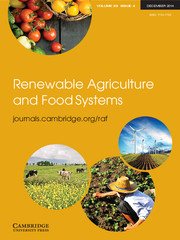Article contents
Food security in the context of energy and resource depletion: Sustainable agriculture in developing countries
Published online by Cambridge University Press: 25 March 2010
Abstract
Food insecurity remains high in most of sub-Saharan African. That insecurity is made even more acute by the increasing scarcity and degradation of natural resources. Low soil fertility is a consistent problem faced by agriculturalists and herders. The dominant international thrust to increase food production has been to stimulate trade, enhanced by technology and its transfer. While international bodies acknowledge the importance of small farmers, they operate as if improving the technologies, trade regimes and value chains that are characteristic of industrial agriculture will have the same results in local ecosystems in developing countries. Price volatility makes access to purchased inputs more risky for smallholders and the governments that subsidize those inputs. The diverse local contexts that serve as the base of African agriculture are thus assumed to be overridden by technology. In contrast, a systems approach that focuses on sustainability of the local ecosystem, social and cultural relationships and economic security can be as, or more productive than industrial agriculture and have a much better opportunity to increase food security in developing countries. Such a systems-based shift in practices, such as the application of conservation agriculture and integrated systemic approaches in Millennium Villages, have potential of addressing household livelihood strategies and production issues in a sustainable, farmer-based way. Resource-conserving agriculture has been shown to increase yields in developing countries. Priority should be given to developing technologies that follow the systems principles of sustainable agriculture, integrating biological and ecological processes (such as nutrient cycling, nitrogen fixation, soil regeneration and biodiversity) into the production processes; minimizing use of non-renewable inputs that cause harm to the environment or to the health of farmers and consumers; and making productive use of the knowledge and skills of farmers and their collective capacities to work together to solve common problems. A variety of models are on the ground in Africa, and there is political will in the African Union to increase investment in agriculture. What sort of investments, policy interventions and capacity building are more effective in increasing productivity and the well-being of agricultural producers? Are strategies aimed at reducing the number of people involved in farming and herding viable in the context of a stagnant world economy?
- Type
- Research Papers
- Information
- Renewable Agriculture and Food Systems , Volume 25 , Special Issue 2: “Sustainable Agriculture Systems in a Resource Limited Future” , June 2010 , pp. 118 - 128
- Copyright
- Copyright © Cambridge University Press 2010
References
- 35
- Cited by


